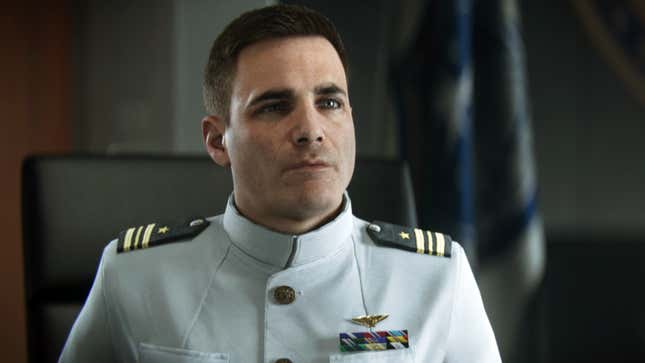
A lawsuit against Activision Blizzard was dismissed last month because, according to a judge in the Southern California District Court where the complaint was brought, the plaintiffs didn’t play enough Call of Duty: Infinite Warfare to make an informed case against the maligned publisher. For once in Activision Blizzard’s many contentious legal battles, things ended smoothly.
According to a report by a litigation associate at the law firm Wilson Sonsini Goodrich & Rosati (who tipped Kotaku off), Activision Blizzard was sued in November 2021 by Brooks Entertainment, Inc., a California-based company specializing in film and TV production and other forms of entertainment. However, Kotaku couldn’t find an official website for the company. Brooks Entertainment and its CEO, Shon Brooks, who describes himself as an inventor, claim they hold the trademarks for the financial mobile games Save One Bank and Stock Picker. It should be noted that Kotaku couldn’t verify the existence of these games, either. Regardless, all three of these entities, alongside Activision Blizzard and 2016's Infinite Warfare, were at the center of the lawsuit.
In November 2021, Brooks Entertainment alleged Activision ripped off intellectual property from both Save One Bank and Stock Picker, as well as the identity of its owner, in Infinite Warfare. To be more specific, the complaint asserted the “main character” for the 2016 first-person shooter, Sean Brooks, was based on the company’s CEO and that all three games had “scripted battle scenes that take place in a high fashion couture shopping center mall.” There were other similarities, too, but these claims were the crux of the complaint.
But if you’ve played just an hour or so of Infinite Warfare, you’d know this is all wrong. For one, the main character isn’t Corporal Sean Brooks at all but rather his squadmate Commander Nick Reyes, a space marine who becomes the captain of the game’s primary militia. Moreover, while there is a scripted battle scene in a shopping mall, it takes place in far future Geneva, one of many in-game locations, and Sean Brooks ain’t in it. You play as Reyes the entire time.
In January 2022, Activision’s counsel wrote to Brooks Entertainment’s counsel that the complaint “contain[ed] serious factual misrepresentations and errors, and that the claims set forth therein are both factually and legally frivolous.” If the company didn’t withdraw the lawsuit, Activision would file Rule 11 sanctions, penalties requiring the plaintiff to pay a fine for submitting dubious or improper arguments without substantial—or, for that matter, accurate—evidentiary support. And that’s exactly what happened in March 2022, when Activision filed its motions for sanctions against Brooks Entertainment, saying the plaintiffs failed to play Infinite Warfare and provided inaccurate filings.
The Southern California District Court accepted Activision’s motions on July 12, dismissed Brook Entertainment’s lawsuit with prejudice (meaning the claim cannot be refiled in that court), and ordered the plaintiff’s counsel to compensate the troubled publisher for the money and time it wasted. In its conclusion, the court said the plaintiff failed to conduct a thorough and reasonable inquiry into the relevant facts about the game before filing the suit.
“Call of Duty: Infinite Warfare is a first-person shooter game, not first- and third-person as alleged, and Sean Brooks does not conduct a scripted battle scene in a high fashion couture shopping mall,” the court said in its ruling in favor of Activision. “Plaintiff’s counsel could have easily verified these facts prior to filing the factually baseless Complaint, just as the Court easily verified them within the first hour and a half of playing the game.”
Kotaku reached out to Activision Blizzard for comment.
Richard Hoeg, a lawyer who specializes in digital and video game law, told Kotaku that unprotectable concepts like the names of people used in fictional entertainment are pretty difficult to copyright and claim infringement upon.
“It’s hard to say why the suit was brought up,” Hoeg said. “Certainly if a suit gets kicked out *with sanctions* it wasn’t a very good one in the first place. It might be simply hubris or it may have been counsel encouraging a suit against a well-resourced party. The suit itself says [Brooks Entertainment] pitched a game to Activision between 2010 [and] 2015. That all said, the infringement lawsuit is awful, alleging infringement on such unprotectable concepts as: ‘Shon Brooks navigates through both exotic and action-packed locations and Sean Brooks navigates through both exotic and action-packed locations.’”
Hoeg went on to say it’s hard getting “actual sanctions imposed on you” because that would be a level of bad lawsuit filing well above just a simple dismissal.
“The court basically finds the whole argument crazy,” Hoeg concluded. “Brooks Entertainment even included Rockstar Games for no reason (which didn’t help their cause with the judge). So, the sanctions here are Brooks Entertainment [has] to pay for Activision’s legal fees and costs.”
While things may have ended well for Activision this time, the disparaged publisher is still causing legal headaches. The company was just blasted by Diablo devs for union-busting. Again. Ugh.